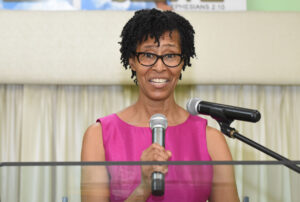#Jamaica, August 29, 2023 – Glowing tributes have been paid to the late veteran regional journalist, Beverley Sinclair, with several persons in the profession remembering her as a guiding light for many careers and builder of the Caribbean.
Sinclair who died on July 22, after a brief illness, was interred in her native Montego Bay, Jamaica, on August 27. During a thanksgiving service, held on August 24, at the St. Andrew Church of Christ, on Red Hills Road, in Kingston, friends and journalists who blossomed from her mentorship, shared how the 35-year media icon impacted their lives and countries in the region.
During a thanksgiving service, held on August 24, at the St. Andrew Church of Christ, on Red Hills Road, in Kingston, friends and journalists who blossomed from her mentorship, shared how the 35-year media icon impacted their lives and countries in the region.
Former reporter with Community Channel, which later became Flow Grenada, and now Corporate Communications Officer of the Child Protection Authority, in Grenada, Blossom Alexis-Welsh, recalled how for 12 years, her late former manager, helped her to become the “journalist that I am today. I am thankful to have had that experience,” she told the mourners.
The now corporate communications professional added that “we knocked heads” a few times, but it was “always for my betterment and development. I am sad that I never got the opportunity to tell her how much of an impact she had on my life and career. She did a fantastic job in teaching me things that I use even today. Her passing has hit me hard,” Welsh said.
Senior reporter with the Jamaica Information Service, Garfield Angus, who gave a tearful presentation, said their working relationship only lasted for one year, but it was like a “decade. She was a woman of strength and dignity, who had great motivating skills. Throughout the time that she was my immediate supervisor, she was more than a boss, and through wisdom she showed kindness, mentorship, and courage in many of the challenges that she had to contend with.
Angus, while being comforted by his colleagues, declared that Sinclair joining the JIS as Editorial and Photography Manager was “timely, and a Heavenly guided intervention for me personally, and it impacted my development immensely,” he said.
Manager was “timely, and a Heavenly guided intervention for me personally, and it impacted my development immensely,” he said.
Evangelist with the church, Alphanso Grennell remarked that it was very rare” someone to only have one year experience with his manager, and “and that is the only person who attend the funeral, being a male, and cried. Angus, you are a brave, and I respect you for that. That shows the level of impact that Sister Sinclair had on Mr. Angus,” the Evangelist said.
Another reporter with the JIS, Chanel Sence said she was grateful to work with Sinclair, as she had little experience, and needed a supervisor with patience and good listening skills. “My fondest memory with her was the hour-long conversation we had during my appraisal about travelling, seeing the world, and ensuring that we had nothing in which we regretted throughout our lives,” Spence said.
Friend of the late media manager, Margaret Francis, said Sinclair, through her various media engagements, brought out the best in the Caribbean. “Beverley was a gem of the Caribbean. Soft spoken but was a very straightforward and forthright personality. She was such a wonderful human. She lived a life devoted to fighting hate, hurt, and grabbing,” Francis said.
Administrative team member at the JIS, Jodi-Ann Palmer described her late former boss as a “pleasant disposition made working with her such an absolute joy. Her words were often seasoned with grace, as she led with a graciously gentle, albeit firm hand. She was quite passionate and serious about getting the job done, with each person playing their part,” she said.
Sinclair daughter, Channtal Golding-Wiles, remembered her mother as a disciplinarian, who gave her best for people. She loved me, she loved God, and she loved people who were of pure hearts and minds,” she reminisced.
In 2016, Sinclair got involved in Granada’s civil society groups, mainly, the Independent Caucus for Constitution Reform. and was one of the hosts of its weekly media programmes, facilitating public awareness and education on the country’s constitution and critically examining proposed legislation and policies.
Sinclair was part of the 2013 launch of the regional television programme ‘Time to Face the Facts,’ which was given recognition by the International Monetary Fund (IMF), and she was also a judge for the Caribbean Broadcasting Union (CBU) media awards for excellence.
Her career started at the in 1988 as an Associate Editor for the Vacationer newspaper, in Montego Bay, St. James. From there she worked as a Senior reporter for the then Jamaica Record, a Sub-Editor at the Western Mirror, thereafter she moved to Grenada, and worked at The Grenadian Voice, then on to the Manager for News and Programming for CC6 Television, in Grenada from 2005 – 2017, and from 2021 to 2022.
Release: JIS
1st insert: Channtal Golding-Wiles (centre), who is the daughter of the late veteran regional journalist, Beverley Sinclair, in discussion with senior reporter with the Jamaica Information Service (JIS), Garfield Angus (left), and administrative team member with the agency, Jodi-Ann Palmer (right), at a recent thanksgiving service, held at the St. Andrew Church of Christ, in Kingston, Jamica.
2nd insert: Senior Reporter with the Jamaica Information Service (JIS), Garfield Angus, sings the memorial book for his late former manager, Beverley Sinclair, at a recent thanksgiving service, held at the St. Andrew Church of Christ, in Kingston, Jamica.
3rd insert: Friend of the late veteran regional journalist, Beverley Sinclair, Margaret Francis pays her tribute at a recent thanksgiving service, held at the St. Andrew Church of Christ, in Kingston, Jamica.
Contributed Photos

